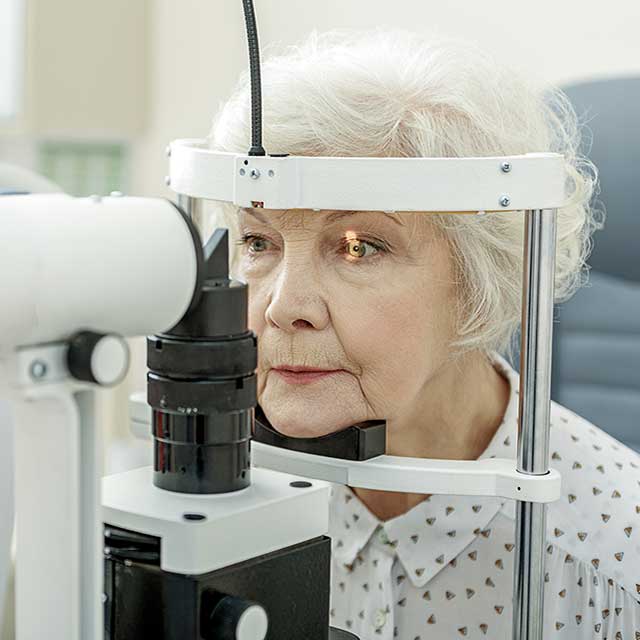Macular Degeneration
Casey Tepperman treats patients with Macular Degeneration from all over Toronto, Ontario, helping them manage their condition and enjoy a high quality of life.
Macular Degeneration is an eye disease that negatively impacts a person’s central vision. This happens when the macula, which is located in the back of the eye, becomes damaged. In healthy eyes, light passes through the macula on to the retina, sending a message to the brain. The brain then interprets it, helping you understand the images and objects that you see.
With an impaired macula, this flow of light and messaging to the brain is disrupted, resulting in either a partial or complete loss of central vision. Central vision refers to the things that you can see when you look straight ahead. Driving, reading, sewing, and seeing clearly in front of you becomes problematic for someone with Macular Degeneration.


High Risk of Macular Degeneration
Age-Related Macular Degeneration (AMD) affects the senior population the most. As a person ages, certain areas of the body change and can weaken over time. But unlike other health issues, AMD can cause permanent blindness when left untreated. In fact, it is the leading cause of blindness in people over the age of 65.
Women tend to develop Macular Degeneration at significantly higher rates than men. One suspected reason is due to their higher life expectancy, although others attribute it to social and economic causes.
Family history is another factor that puts someone at risk for Macular Degeneration. If a parent or grandparent had it, you may be genetically predisposed to develop the condition, as well.
Juvenile Macular Degeneration
Although seniors remain among the highest number of Macular Degeneration patients, there is a younger version of the disease known as Juvenile Macular Degeneration. This affects children and adolescents, some in early childhood and others in their 20s. There are several different forms of the disease, but all are inherited genetically.
This condition can manifest itself in school, sports, or extracurricular activities. A loss of central vision can impact a child’s ability to learn and advance in their studies every year. In later stages, the ability to see sharp color can be affected. Some symptoms may go unnoticed for years until the child gets older.
If Macular Degeneration runs in your family, getting checked sooner rather than later is essential for an early diagnosis and treatment.


How is Macular Degeneration Treated?
Macular Degeneration does not have a treatment to reverse the disease or restore central vision loss. However, there are a number of methods aimed at stopping further damage to the macula once it has begun and tools that can enhance the patient’s remaining vision.
A number of devices such as magnifiers and telescopes can enlarge images or objects, allowing you to see things in more detail. Some vision aids are placed on top of special glasses to help with driving, writing, or using a computer. Other options include hand held magnifiers which are used for reading a book or newspaper.
{PracticeName} has some of the most cutting-edge and advanced technologies to quickly and effectively test for Macular Degeneration. Let {DoctorName} and the talented, caring staff help provide you with the tools to improve your vision and get back to doing the things you enjoy.
